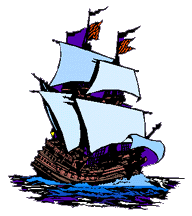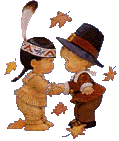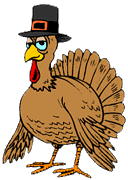
THE TANKSGIVING STORY
In order to trace the beginning of our modern-day Thanksgiving Holiday, we need to go back in time to 1609, when a group of puritans left England seeking religious freedom in Holland. After a few years, the Puritans grew concerned that the "frivolous" ways and ideas of the Dutch would pose a threat to the education and morality of their children.
So, they decided to leave Holland, to travel to the "New World". The Puritans agreed to work seven years for a group of English financial investors, in exchange for passage to their destination.
The pilgrims sheltered on the ship through the winter, which would prove to be devastating. Less than 50 of the original 110 Puritans who left England survived the many illnesses of the harsh winter.
Attack by the local Native American Indians, the Patuxets, was the Pilgrims biggest concern. But the indians were a peaceful group and did not prove to be a threat.
Squanto's importance to the Pilgrims was enormous. It can be said that they would not have survived without his help. It was Squanto who taught them much about planting and survival in their new enviroment.
By the fall, the pilgrims had much to celebrate. The October harvest was very successful. They had enough food to be put away for the winter. They had built their homes in the wilderness. And, they were at peace with their Indian neighbors. They had beaten the odds and it was time to celebrate.
There is no record that this feast was called a "thanksgiving." In fact, although it was the custom of the Puritans to appoint certain days for giving special thanks, they did not celebrate "holidays". The first record of such an occassion, was two years later, when the colonial Governor William Bradford proclaimed November 29, 1623 "a day of thanksgiving", for rain that ended a terrible drought. The rain followed soon after Governor Bradford ordered a day of fasting and prayer, during the drought.
November 29, 1623 is believed to be the true beginning of the present day Thanksgiving Holiday. The custom of an annually celebrated thanksgiving day following harvests, later came to be celebrated throughout the New England Colonies, but on different and varying dates. Later the custom was kept alive by proclamations of state governors. During the American Revolution (late 1770's) a day of national thanksgiving was suggested by the Continental Congress. In 1863 President Abraham Lincoln appointed a national day of thanksgiving. Since then each president has issued a Thanksgiving Day proclamation, usually designating the fourth Thursday of each November as the holiday.
 In October of 1620, they set sail abourd the Maflower, for a long difficult journey, that would last 65 days. On December 21, 1620, they went ashore at a place they called Plymouth.
In October of 1620, they set sail abourd the Maflower, for a long difficult journey, that would last 65 days. On December 21, 1620, they went ashore at a place they called Plymouth. On March 16, 1621, the Pilgrims were frightened when an Indian brave walked into their settlement, until he called out "Welcome!" in English. He was an Abnaki Indian, named Samoset, who had learned English from fishing boat captains. Samoset left the next day, but soon returned with another Indian named Squanto , who spoke better English than Samoset.
On March 16, 1621, the Pilgrims were frightened when an Indian brave walked into their settlement, until he called out "Welcome!" in English. He was an Abnaki Indian, named Samoset, who had learned English from fishing boat captains. Samoset left the next day, but soon returned with another Indian named Squanto , who spoke better English than Samoset.
In mid-October of that year (1621), the pilgrims held a harvest festival, to celebrate their good fortune. The festival lasted for three days and was shared by all the colonists and their Hative American neighbors. Squanto joined the celebration, as well as the indian chief, Massasoit, and 90 other braves.
 Throughout history the bountiful harvest has been celebrated with thanksgiving ceremonies. Here in America, Thanksgiving Day has become a time to offer thanks, of family gatherings and holiday meals. A time for feasting on turkeys, stuffing, and pumpkin pie. This year, as you celebrate Thanksgiving, why not take a minute to remember that first Thanksgiving. Remeber those who struggled and conquered adversity for the freedoms and liberty, we enjoy today.
Throughout history the bountiful harvest has been celebrated with thanksgiving ceremonies. Here in America, Thanksgiving Day has become a time to offer thanks, of family gatherings and holiday meals. A time for feasting on turkeys, stuffing, and pumpkin pie. This year, as you celebrate Thanksgiving, why not take a minute to remember that first Thanksgiving. Remeber those who struggled and conquered adversity for the freedoms and liberty, we enjoy today.

Thanksgiving is a time of celebration. It is a time to celebrate the convictions and courage of the pilgrims, who's legacy and spirit has become our bounty from our great nation. Thanksgiving is a time of reflection. It is a time to stand back and realize just how fortunate we really are. It is a time to be thankful for our families, our friends, and all the many other wonderful blessings we have been given. But, above all else, Thanksgiving is a time to give thanks to the one from whom all our many blessings come. It is a time to give thanks to God for all that he has given us, for our lives and for our hopes for our future. It is a time to, not only, be thankful for our blessings, but it is, also, a time to remember those blessings came from God. All that is good and perfect comes from above, from God. So, let us give thanks today, and everyday, always remembering the giver, not merely the gifts themselves.

WE GATHER TOGETHER
(Background music playing)
When the settlers first came to the "new world", they brought along "The Prayer Of Thanksgiving". Later, the prayer was set to music, based on a Netherlands folk hymn. A favorite in the colonies, it has now become a traditional Thanksgiving hymn.
|
|
We gather together to ask the Lord's blessing; he chastens and hastens his will to make known. The wicked oppressing now cease from distressing. Sing praises to his name, he forgets not his own. |
|
Beside us to guide us, our God with us joining, ordaining, maintaining his kingdom divine; so from the beginning the fight we were winning; thou, Lord, wast at our side, all glory be thine! |
|
|
|
We all do extol thee, thou leader triumphant, and pray that thou still our defender wilt be. Let thy congregation escape tribulation; thy name be ever praised! O Lord, make us free! |
|
Words: Nederlandtsch Gedencklanck; trans. by Theodore Baker |
Music: 16th cent. Dutch melody; arr. by Edward Kremser |
 |
THANKSGIVING TRADITIONS |
 |
GIVING THANKS |
 |
HOLIDAYS |  |
HOME |
